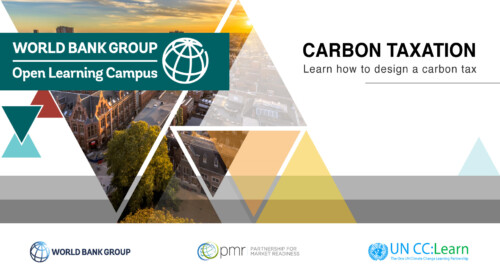Recent years have seen renewed and growing interest in policy instruments that put a price on greenhouse gas (GHG) emissions through the adoption of carbon taxes. About half of the Nationally Determined Contributions (NDCs) submitted by governments under the Paris Agreement mention carbon pricing as a cost-effective tool to meet climate targets.
As pricing schemes multiply they become increasingly varied. Today, carbon taxes cover a broad range of sectors and include novel features, demonstrating their ability to adapt to varying policy goals and national contexts. The versatility of carbon taxes also means that policy makers need a clear picture of the available options and how those options fit with the jurisdiction’s context and objective.
Responding to the knowledge and skills needs of policy makers, the Partnership for Market Readiness (PMR) and United Nations Institute for Training and Research (UNITAR) jointly developed a blended learning methodology comprising online and face-to-face instruction. The overall goal of the training is to build and strengthen capacities of policy makers in relation to carbon pricing. The training seeks to support the target audience in designing and implementing a tax that is best suited to their specific needs, circumstances, and objectives.
Building upon the Carbon Tax Guide: A Handbook for Policy Makers1, this learning experience aims to familiarize users with basic concepts, terminology and empirical evidence regarding carbon taxation. While the course is introductory in nature, learners will benefit greatly from a pre-existing, decent understanding of:
- The functioning of market economies, including basic concepts such as rational agency, the influence of prices on supply and demand, and investments
- The role of public policy in shaping economic, social and environmental outcomes and achieving international and national commitments
This pre-existing knowledge is not a prerequisite to take the course. You are invited to enroll even if you believe you're new to the topic.
Target Audience
The online course provides clear, concise and up-to-date information for anybody interested in building a solid understanding of carbon taxation. The course should be of particular interest to the following audiences:
- Stakeholders who wish to follow the global discourse on carbon taxation or who are involved in designing and implementing carbon taxes
- Mid-level project developers and policy makers such as representatives from Ministries
- Technical experts and practitioners engaged in country-level work within the PMR
Learning Objectives
Upon completion, you will be able to:
- Describe how carbon taxes work in reducing greenhouse gas emissions
- Outline key considerations that shape the decision to adopt carbon taxes
- Summarize approaches for determining the carbon tax base and rate
- Differentiate main undesirable effects and mitigation measures
- List options for revenue use









